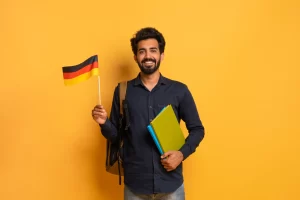Germany, with its world-renowned academic institutions, thriving economy, and welcoming culture, has firmly established itself as a premier destination for higher education. For Indian students, particularly those from vibrant states like Kerala, the prospect of pursuing a Masters in Germany, often at prestigious public universities in Germany with minimal tuition fees, is incredibly appealing. The blend of high-quality education, cutting-edge research opportunities, and excellent post-graduation career prospects makes Germany a top choice.
However, the path to securing admission isn’t always straightforward. The application process for German universities is known for its meticulous requirements and specific procedures. Many aspiring students, despite having strong academic profiles, unfortunately stumble upon common pitfalls that can jeopardize their chances. Navigating this complex landscape requires careful planning, attention to detail, and a clear understanding of expectations. Recognizing these potential hurdles is the first step towards a successful application. This guide highlights the top five mistakes Indian students frequently make when applying to German universities and, crucially, how to avoid them, ensuring your dream of studying in Germany becomes a reality. Sometimes, navigating these complexities is easier with a guiding hand, and experienced German education consultants in Kerala often provide that crucial support system.
Mistake 1: Insufficient Research on Universities and Courses – Casting the Net Too Wide or Too Narrow
Germany boasts over 400 higher education institutions, each with unique strengths, course offerings, and admission criteria. A common mistake is applying without adequate research, leading to several potential problems:
- Mismatching Profiles: Applying to highly competitive programs without meeting the specific academic or experiential prerequisites. For instance, some Masters programs require specific undergraduate credits in certain subjects, or even relevant work experience.
- Ignoring ‘NC’ Subjects: Many popular courses, especially at top public universities in Germany, have “Numerus Clausus” (NC), meaning restricted admission based on grades. Students might apply without realistically assessing their chances based on their academic scores and the typical NC threshold for previous years. Understanding the German grading system conversion is vital here.
- Course Language Confusion: While many Masters programs are offered in English, students might overlook programs requiring German proficiency or mistakenly assume an English-taught program has no German language component whatsoever (sometimes basic German is still beneficial or required for internships/daily life).
- Overlooking University Specialization: Applying to a university generally known for engineering for a specialized arts program, or vice-versa, without checking if that specific department holds a strong reputation or offers the desired focus areas.
How to Avoid This:
- Dive Deep: Go beyond university rankings. Explore specific department websites, read course modules and descriptions in detail, and check faculty profiles. Understand the program’s focus and ensure it aligns with your academic background and career goals.
- Utilize Resources: Leverage platforms like the DAAD (German Academic Exchange Service) database, Hochschulkompass, and university-specific portals for accurate information on courses, language requirements, and admission criteria.
- Check NC Requirements: Research the NC values for your desired courses from previous semesters (available on many university websites) to gauge competitiveness.
- Be Realistic: Assess your profile honestly. Apply to a mix of universities – some aspirational, some realistic, and some safe – based on your grades, experience, and the program requirements.
- Seek Clarity: The sheer volume of options can be overwhelming. This is where guidance becomes invaluable. Consultants specializing in German education for Kerala students can help shortlist universities and programs that are the best fit for an individual’s profile and aspirations, saving time and improving application success rates.
Mistake 2: Underestimating Documentation Requirements & APS Certification
The German application process demands precision. Universities and visa authorities require a specific set of documents, often with strict formatting and authentication rules. Errors here are common and can lead to immediate rejection or significant delays.
- Incomplete or Incorrect Transcripts: Submitting transcripts that don’t list all subjects, grades, or lack official university seals/signatures.
- Improper Translations/Certifications: Providing translations of documents (like mark sheets or degrees) that aren’t done by a certified translator or failing to get copies officially attested (notarized).
- Missing Language Proof: Failing to submit valid and recognized proof of language proficiency (e.g., IELTS/TOEFL for English-taught programs, TestDaF/DSH/Goethe certificate for German-taught ones) meeting the specific score requirements by the deadline.
- APS Certificate Issues: The Academic Evaluation Centre (Akademische Prüfstelle – APS) certificate is now mandatory for Indian students applying for a German student visa. Mistakes include applying too late for the APS certificate (processing takes time!), submitting incorrect documents to APS, or failing the verification process.
- Late Submissions: Simply missing the application deadline, even by a day, usually results in the application not being considered.
How to Avoid This:
- Start Early & Create a Checklist: Begin gathering documents months in advance. Create a detailed checklist for each university, noting specific requirements and deadlines (which often vary).
- Verify Authenticity: Ensure all academic documents are official, complete, and correctly formatted. Get translations done by sworn translators recognized by the German embassy/consulate. Obtain certified copies where required (often possible at the German embassy/consulate or sometimes via specific notary publics).
- Prioritize APS: Apply for your APS certificate as soon as you decide to study in Germany. Ensure all documents submitted to APS are accurate and meet their guidelines precisely. Factor in the processing time when planning your university applications.
- Meet Language Requirements: Book your language tests (IELTS, TOEFL, TestDaF, etc.) well in advance, ensuring the scores meet the minimum requirements of your chosen programs. Send scores officially if required.
- Meticulous Organization: Keep digital and physical copies of everything. Label files clearly. Ensure online application forms are filled out completely and accurately before submission. The level of detail required can be daunting, and this is another area where study abroad consultants in Kochi familiar with the German system provide immense value by ensuring documentation is flawless and submitted on time.
Mistake 3: Ignoring Financial Proof (Blocked Account) Nuances
Proof of sufficient funds is a critical component of the German student visa application. For most non-EU students, including Indians, this means setting up a Blocked Account (Sperrkonto) and depositing a specific amount mandated by the German government (currently €11,208 per year, as of late 2023/early 2024 – always check the latest figure).
- Delaying Account Setup: Waiting too long to start the blocked account process. Opening and transferring funds can take several weeks.
- Using Unapproved Providers: Not all banks or financial service providers offering blocked accounts are recognized by all German embassies/consulates. Using an unapproved provider can lead to visa rejection.
- Insufficient Funds: Depositing less than the required amount or failing to account for bank transfer fees, resulting in a shortfall.
- Documentation Errors: Providing incorrect or incomplete documentation to the blocked account provider, delaying activation.
How to Avoid This:
- Act Promptly: Start the blocked account process as soon as you receive an admission offer (or even earlier, if permitted by the provider and you are confident of admission).
- Choose Approved Providers: Use providers officially recognized by the German Federal Foreign Office (e.g., Fintiba, Expatrio, Coracle, Deutsche Bank – check the embassy website for the current list).
- Confirm the Amount: Double-check the exact required amount on the official German embassy/consulate website for the year you are applying. Transfer slightly more to cover any potential fees.
- Follow Instructions Carefully: Read the provider’s instructions meticulously and submit all required documents correctly the first time. Keep records of all transactions and confirmations. Understanding the intricacies of the Sperrkonto is crucial, and German education consultants Kerala often guide students step-by-step through this vital financial requirement.
Mistake 4: Poorly Written Statement of Purpose (SOP) / Letter of Motivation (LOM)
Your SOP or LOM is your chance to speak directly to the admissions committee. It’s more than just an academic record; it’s a narrative explaining your suitability for the program, your passion for the subject, and your future aspirations.
- Generic Content: Writing a single, generic SOP and sending it to all universities without tailoring it to the specific program and institution.
- Lack of Clarity & Focus: Failing to clearly articulate why you chose that specific program, what interests you about the university’s research or faculty, and how it aligns with your career goals.
- Poor Structure & Grammar: Submitting an SOP with grammatical errors, awkward phrasing, or a disorganized structure that is difficult to follow.
- Simply Repeating CV: Using the SOP to merely list achievements already present in the CV, rather than elaborating on motivations and experiences.
How to Avoid This:
- Tailor Each SOP: Research the specific program, curriculum, faculty research interests, and university ethos. Customize your SOP to show genuine interest and fit.
- Be Specific & Authentic: Clearly state your motivations. Connect your past experiences (academic, projects, internships) to the program content. Explain your future goals and how this specific Masters will help you achieve them.
- Structure Logically: Use a clear introduction, body paragraphs detailing your suitability and motivation, and a concise conclusion summarizing your key points and enthusiasm.
- Proofread Meticulously: Ensure flawless grammar, spelling, and punctuation. Ask a trusted friend, professor, or consultant to review it for clarity and impact. Crafting a compelling narrative requires skill, and seeking guidance can help refine your SOP/LOM, making it a powerful tool in your application arsenal.
Mistake 5: Missing Deadlines and Lack of Follow-up
German universities operate with strict deadlines. Missing them usually means waiting for the next intake, often a full year later. Furthermore, simply submitting the application isn’t the end of the process.
- Misunderstanding Deadlines: Confusing university application deadlines with visa application timelines, or mixing up deadlines for different universities or programs (Winter vs. Summer semester). Some deadlines might be for Uni-assist (a centralized application portal for international students) and others directly with the university.
- Last-Minute Rush: Waiting until the final days to submit applications, risking technical glitches, incomplete submissions, or delays in postal mail (if hard copies are required).
- Not Tracking Application Status: Failing to monitor the application portal for updates, missing requests for additional documents, or not receiving admission/rejection notifications promptly.
- Ignoring Communication: Not responding to emails or queries from the university admissions office in a timely manner.
How to Avoid This:
- Create a Master Timeline: Use a spreadsheet or calendar to track deadlines for each university, including Uni-assist deadlines, document submission deadlines, and language test score reporting deadlines. Set reminders well in advance.
- Apply Well Ahead: Aim to submit applications several weeks before the deadline to avoid last-minute stress and potential issues.
- Monitor Portals & Emails: Regularly check the university application portals and your email (including spam folders) for any updates or requests from the universities.
- Be Proactive: If clarification is needed, contact the university’s international office politely and professionally. Efficient management of multiple applications and deadlines is critical. A dedicated consultant service often takes responsibility for tracking and follow-up, ensuring no critical deadline or communication is missed.
Conclusion: Paving Your Path to Success
Applying to study in Germany is an exciting step towards a bright academic and professional future. While the process demands diligence, avoiding these common mistakes significantly enhances your chances of securing admission to your desired program. Thorough research, meticulous documentation including the crucial APS certificate, careful financial planning for the blocked account, crafting a compelling Statement of Purpose, and adhering strictly to deadlines are the cornerstones of a successful application.
The journey from Kerala to a German university lecture hall can seem complex, but it’s entirely achievable with the right preparation and approach. Don’t let avoidable errors hinder your aspirations. Plan carefully, start early, and pay close attention to every detail.
Considering your options to study in Germany? Ensure your application is strong, complete, and submitted on time. For personalized guidance and support tailored to the specific needs of students from Kerala, connecting with experienced German education consultants can make all the difference, transforming a potentially stressful process into a smooth and successful journey.










